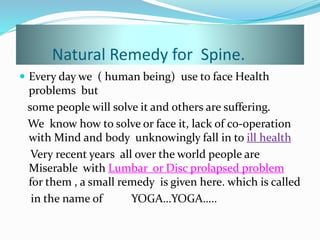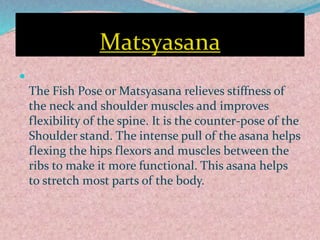Asana for spinal care ppt
- 1. Natural Remedy for Spine. ï Every day we ( human being) use to face Health problems but some people will solve it and others are suffering. We know how to solve or face it, lack of co-operation with Mind and body unknowingly fall in to ill health Very recent years all over the world people are Miserable with Lumbar or Disc prolapsed problem for them , a small remedy is given here. which is called in the name of YOGAâĶYOGAâĶ..
- 2. Human body consist of âĒPhysical body âĒMind âĒSoul
- 3. spine ï Just as a tree needs a strong root system in order to grow properly and sustain good health, the same concept may be employed for the general well being of humans. ï The human root system is comprised of the Central Nervous system (brain and spinal cord) and the Cardiovascular system, which are the first two to develop within the human fetus. Everything else in the body develops subsequently from these two. In conjunction with one another, they bring oxygen, water, nutrients, hormones, and Qi (Energy) to every part of the body as well as excreting post-digestive substances and metabolic waste. ï ..
- 4. Cont.. ï When these two systems are healthy, a human being will be healthy. ï With clean blood vessels free from harmful accumulations and free flowing Qi allows one to improve one's health to its optimal level, therefore allowing our bodies to function as nature intended. ï Given the many stresses we encounter daily in today's busy society, combined with poor dietary habits and lack of exercise, most of us tend to collect plaque, cholesterol, fatty deposits, and toxins causing fat buildup and blockages of arteries and veins as well as blockages of the energetic pathways within our nervous system..
- 5. Physical body ï Muscles ï Skelton ï Skin ï Nervous & tendons ï Blood ï And various internal organs
- 7. Soul Soulâ divided into 2 types ïInner energy Soul ïExternal energy Soul
- 8. Spinal cord (care) The Spinal Column and the Healthy Spine ï The spinal column is one of the most important structures in the human body. ï Supporting much of your weight and protecting the spinal cord, ï which carries communication from the brain to the rest of the body. ï The spinal column is strong but flexible, allowing a wide range of movement. ï The spinal column extends from the base of the skull to the tailbone and is made up of thirty-three bones known as the vertebrae.
- 9. Spine Vertebrae ïThe vertebrae in the cervical, thoracic and lumbar regions are separated by discs. ïDiscs serve as a cushion between the vertebrae, helping also to protect them and the nerves that run from the spinal cord to the rest of the body.
- 10. Cervical vertebrae ï The first seven vertebrae (the cervical vertebrae) ï Radiate down the arms to the hands and fingers. ï These are in the neck and are numbered C1 through C7. ï Nerve compression in this area can cause neck pain, ï which may are fused, and ï They do not have discs between them. ï Each vertebra is composed of a body and a spinous process ï which protect the spinal cord and nerve roots.
- 11. Spine bone
- 12. Thoracic Vertebrae ï The next twelve vertebrae make up the thoracic region (T1- T12); ï The ribs attach to these vertebrae and protect the heart and lungs. ï It is usually very stable.
- 13. The Lumbar Vertebrae ï Vertebrae (L1 -L5). plays a Significant role in motion and flexibility. ï It is the source of motion and supports most of the body weight. ï Overload or taxing movements may strain the structure, ï Compress the nerves and cause back pain, which may Radiate down the legs to the feet.
- 14. SACRUM & COCCYX ï The regions beneath the lumbar spine are the sacrum (S1 -S5) and coccyx (a series of small bones often called the tailbone).
- 15. Spinal Problem ï Mechanical problems: A mechanical problem is due to the way your spine moves or the way you feel when you move your spine in certain ways. ï Perhaps the most common mechanical cause of back pain is a condition called inter vertebral disc degeneration, which simply means that the discs located between the vertebrae of the spine are breaking down with age. ï As they deteriorate, they lose their cushioning ability. This problem can lead to pain if the back is stressed. ï Another cause of back pain is the wearing down of the facet joints, which are the large joints that connect each vertebrae to another. ï Other mechanical causes of back pain include spasms, muscle tension, and ruptured discs, which are also called herniated discs. ï The voluble cause is Our Life style and Diet.
- 16. INJURIES ï Injuries: Spine injuries such as sprains and fractures can cause either short- lived or chronic back pain. ï Nobody wants pain- because of our lifestyle and mal- posture.
- 17. Back Pain ï Back pain may have a sudden onset or can be a chronic pain; it can be constant or intermittent, stay in one place or radiate to other areas. ï It may be a dull ache, or a sharp or piercing or burning sensation. ï The pain may radiate into the arms and hands as well as the legs or feet, and may include symptoms other than pain, such as weakness, numbness or tingling.
- 18. Back painâĶâĶ ï The spine is a complex interconnecting network of nerves, joints, muscles, tendons and ligaments, and all are capable of producing pain. ï Large nerves that originate in the spine and go to the legs and arms can make pain radiate to the extremities.
- 19. Anatomically ï Back pain can be divided Neck Pain Middle Back pain Lower back pain Tail bone pain.
- 20. Duration Acute pain(Less than 4 weeks) Sub acute pain(4-12 weeks) Chronic pain(greater than 12weeks)
- 21. Cause ï Moving in a wrong position ï Lifting huge weight beyond our limit ï Back pain with radiculopathy or spinal tensions , and back pain associated with another specific cause (such as infection or cancer). ï Non specific pain indicates that the cause is not known precisely but is believed to be due from the soft tissues such as muscles, fascia, and ligaments.
- 24. Yoga Basic Asana Bhujanga asana Artha matyasendra asana Marjary asana Vyagara asana Munduka asana ( backward position) Tada asana (palm tree pose ) Pawana muktha asana Salabha asana Uttana padaasana
- 25. Savasana ï The specific Yoga asanas for Spinal Cord problems brings about stronger and more flexible spine. The Corpse Pose (Savasana) is considered as a classic relaxation pose for back aches and is practiced before or in between Asanas as well as a final relaxation. Savasana is often recommended to be the usual sleeping pose for the person suffering from backache as well. ï Sleeping on a hard ground, without pillows, serve as a magical treatment to minor back problems.
- 26. Matsyasana ï The Fish Pose or Matsyasana relieves stiffness of the neck and shoulder muscles and improves flexibility of the spine. It is the counter-pose of the Shoulder stand. The intense pull of the asana helps flexing the hips flexors and muscles between the ribs to make it more functional. This asana helps to stretch most parts of the body.
- 27. BHUJANGASANA ï The Cobra Pose improves spinal flexibility and strengthens the muscles in the arms and back. The pose of Balasana is a gentle way of stretching the shoulders, hips, thighs, ankles, and back muscles.
- 28. BHUJANGASANA
- 29. SETHU BANDHA
- 30. MARJAARI ASANA
- 31. SALABHASANA ï Locust Pose or Salabhasana works primarily on the upper back, the Locust Pose targets the lower part. This posture also strengthens the abdominal area, arms, and legs. Backbends usually give relief to spinal cord problems like Lordosis. When done purposefully backbends increase the curve of the lower back.
- 32. SALABHASANA
- 33. vyagarasana ï This asana helps in eliminating excess gas in the stomach. Single Leg Raises is performed in order to prepare the body for other exercises.
- 34. Vyagraasana - Tiger pose ï Benefits: ï Tones the spinal nerves. ï Relaxes the sciatic nerves. ï Relives sciatica. ï Loosens up the legs. ï Tones up the vaginal passage after the child delivery. ï Stretches the abdominal muscles. ï Promotes digestion. ï Stimulates blood circulation. ï Reduces weight from the hips and thigh.
- 35. VYAGRASANA â TIGER POSE.
- 36. Pawanmuktha Asana ï Benefits : ï Strengthens the Lower back Muscle and loosens the spinal Vertebrae. ï Massaging the Pelvic Muscles ï Very effective in removing Wind & Constipation.
- 37. UTTHANA PADASANA ï Benefits : ï Strengthens the abdominal Muscles and Massage the organs ï It strengthens the Lower back, Pelvic muscles ï It helps to correct the prolapsed disc
- 39. Correct Diet ï Magnesium-Rich Foods ï Foods Containing Omega-3 Fatty Acids ï Vitamin âA, D&K ï Calcium-Iron
- 40. Naturopathy ïSpine bath Steam bath ïMassage ( if you require or suggested by doctor ) ïVegetable juice ïFruits juices. ïStand a little time under the sun every day. Gain more benefit.
- 41. Counseling ï Explain about the Problem and make them to accept their mistakes. ï Teach them how to recover fast from their problem. ï Train them ,How to practice Asana and Pranayama and also make them to familiar in that practice ï Guide them and assist , mind make up
- 42. Conclusion ï Life is a small stage ,where we are acting in a different character . During our play our physical body and mind should be in healthy and sound. ï For which we need Health, endurance, stamina and peace Every one should follow the following parameters regularly then ,there is no miserable in our body. ï Perfect food ï Correct exercises ï Healthy and sound sleep ï Positive thought ( No stress and tension) ï spine is our wealth we have to maintain in a safe way.
- 43. THANKS ï My Heartiest thanks to readers. Dr. U.srikumar BNYS, Msc, Msc, Msc, Phd, GOMUKESHWARA RESEARCH INSTITUTE OF YOGA NATUROPATHY TURST, COIMBATORE -641018. +91422 2380282 +91 9944069212 web.gomukeshwara.com
Editor's Notes
- #30: STRENTHNING THE BACK MUSCLE











































